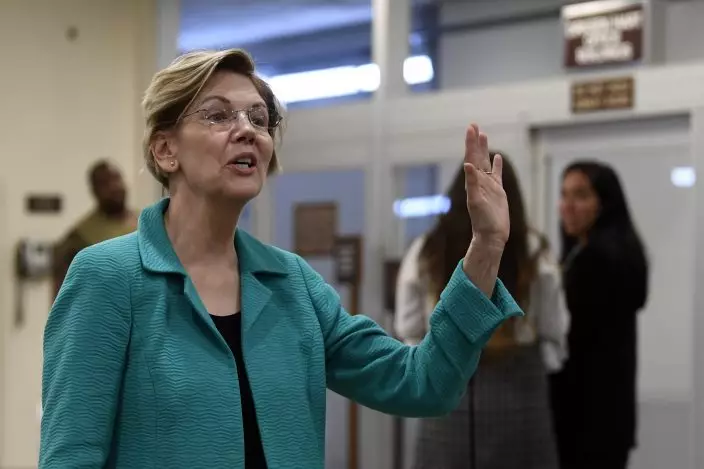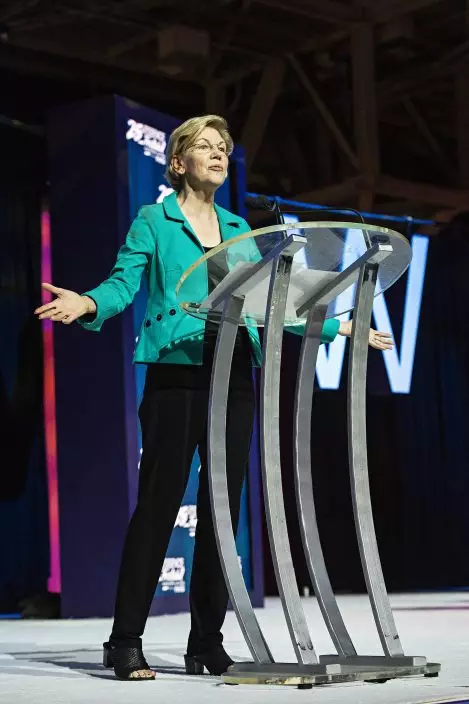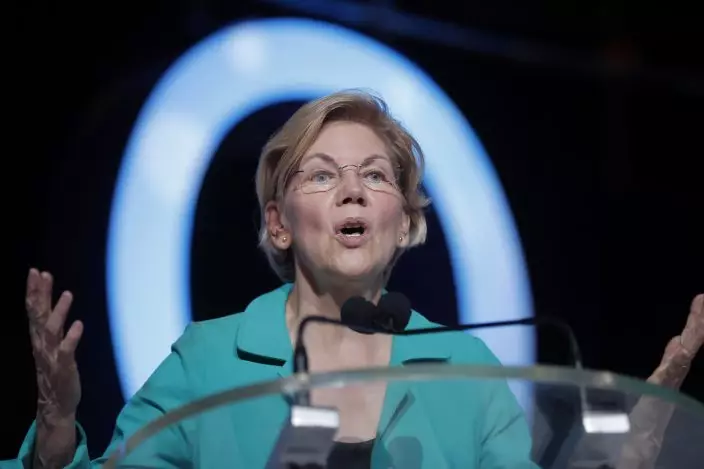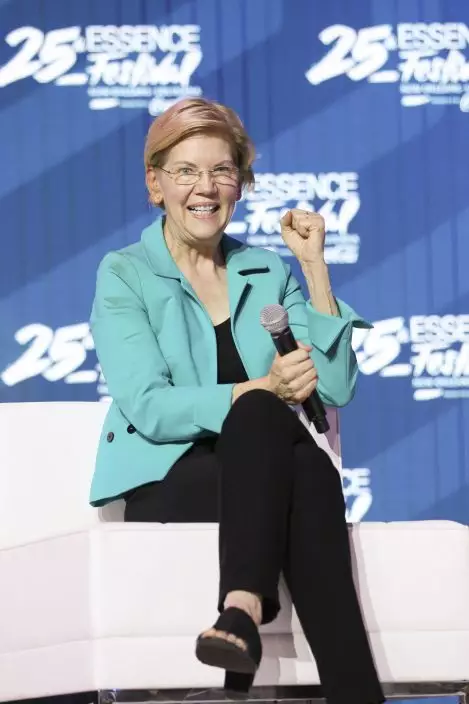White House hopeful Elizabeth Warren is proposing new regulations on the private equity industry, pitching constraints designed to end what she decries as "legalized looting" by investment firms that take over troubled companies.
Warren's plan, the latest in a series of policy ideas that have propelled the Massachusetts senator to the top tier of the 2020 Democratic presidential primary, would hold private equity firms liable for debts and pension promises made by the companies they buy up. It would restrict the firms' ability to pay dividends as well as high fees that shift money out of acquired companies.
The new private equity rules bring Warren's detail-driven campaign back to the familiar ground that launched her political career — reining in Wall Street.

Sen. Elizabeth Warren, D-Mass., responds to a reporter's question on Capitol Hill in Washington, Wednesday, July 10, 2019, after attending a briefing on election security. (AP PhotoSusan Walsh)
Warren, the former chair of the independent panel that oversaw the government's 2008 bailout of major financial institutions, is a longtime foe of the financial industry who has underscored since launching her presidential run that she is a capitalist. But like democratic socialist Bernie Sanders , a rival for the Democratic nomination to challenge President Donald Trump, Warren is building her campaign around a promise of sweeping upheaval she says would spread around more of the benefits of economic growth.
"I am tired of big financial firms looting the economy to pad their own pockets while the rest of the economy suffers," Warren wrote in a Medium post on Thursday announcing her plan. "I am done with Washington ignoring the evidence and acting as though boosting Wall Street helps our families. Financial firms have helped push our economy badly off track."
Warren's private equity proposals also include new rules that would require worker pay to take precedence over other obligations when companies declare bankruptcy as well as more open disclosure of investment firms' fees, both of which are included in private legislation she's set to introduce later Thursday alongside Senate and House Democratic colleagues. Her platform further calls for the restoration of dividing lines between commercial and investment banking that were repealed in 1999, a change that was part of both the Republican and the Democratic platforms during the 2016 presidential election despite Trump's lack of emphasis on it during his campaign.

Democratic presidential candidate, Sen. Elizabeth Warren, D-Mass., speaks at the 2019 Essence Festival at the Ernest N. Morial Convention Center on Saturday, July 6, 2019, in New Orleans. (Photo by Amy HarrisInvisionAP)
Warren is headed to Iowa for a two-day campaign swing during which she's likely to tout her new private equity plan, the latest installment of a broader self-described "economic patriotism" agenda that also includes a $2 trillion investment in environmentally friendly manufacturing .
Besides bolstering her credentials as an antagonist of Wall Street, Warren's new proposal also gives her the chance to tout her avoidance of high-dollar fundraisers and reliance on small donors to power her campaign. Sanders, a Vermont senator, has similarly vowed to forgo high-dollar fundraisers, but the private equity industry remains a notable supporter of several of their Democratic presidential rivals .
Federal Election Commission records show that employees of Blackstone, which leads Private Equity International's ranking of top private equity firms, have donated a total of $102,100 to 11 Democratic presidential hopefuls this year, with South Bend, Indiana, Mayor Pete Buttigieg topping the list of recipients at $30,800. Neither Warren nor Sanders reported receiving contributions from the private equity giant's employees.

Democratic presidential candidate, Sen. Elizabeth Warren, D-Mass., speaks at the 25th Essence Festival in New Orleans, Saturday, July 6, 2019. (AP PhotoGerald Herbert)
Associated Press writer Brian Slodysko contributed to this report.

Sen. Elizabeth Warren, D-Mass, is photographed at the 2019 Essence Festival at the Ernest N. Morial Convention Center on Saturday, July 6, 2019, in New Orleans. (Photo by Donald TraillInvisionAP)
UNITED NATIONS (AP) — Russia on Wednesday vetoed a U.N. resolution sponsored by the United States and Japan calling on all nations to prevent a dangerous nuclear arms race in outer space.
The vote in the 15-member Security Council was 13 in favor, Russia opposed and China abstaining.
The resolution calls on all countries not to develop or deploy nuclear arms or other weapons of mass destruction in space, as banned under a 1967 international treaty that included the U.S. and Russia, and to agree to the need to verify compliance.
U.S. Ambassador Linda Thomas-Greenfield said after the vote that Russian President Vladimir Putin has said Moscow has no intention of deploying nuclear weapons in space, but that the country's veto raises the question of what the government may be hiding.
THIS IS A BREAKING NEWS UPDATE. AP’s earlier story follows below.
UNITED NATIONS (AP) — The U.N. Security Council is set to vote Wednesday on a resolution sponsored by the United States and Japan calling on all nations to prevent a dangerous nuclear arms race in outer space. It is likely to be vetoed by Russia.
The resolution calls on all countries not to develop or deploy weapons of mass destruction, like nuclear arms, in space.
U.S. Ambassador Linda Thomas-Greenfield told a council meeting on March 18 where she announced the resolution that “any placement of nuclear weapons into orbit around the Earth would be unprecedented, dangerous and unacceptable.”
Russia’s deputy U.N. ambassador, Dmitry Polyansky, retorted that Moscow’s initial impression was that the resolution is “yet another propaganda stunt by Washington” and is “very politicized” and “divorced from reality.”
The announcement of the resolution followed White House confirmation in February that Russia has obtained a “troubling” anti-satellite weapon capability, although such a weapon is not operational yet.
Russian President Vladimir Putin declared later that Moscow has no intention of deploying nuclear weapons in space, claiming that the country has only developed space capabilities similar to those of the United States.
The draft resolution says “the prevention of an arms race in outer space would avert a grave danger for international peace and security.”
It urges all countries carrying out activities in exploring and using outer space to comply with international law and the U.N. Charter.
The draft “affirms” that countries that ratified the 1967 Outer Space Treaty must comply with their obligations not to put in orbit around the Earth “any objects” with weapons of mass destruction, or install them “on celestial bodies, or station such weapons in outer space.”
The treaty, ratified by some 114 countries including the United States and Russia, prohibits the deployment of “nuclear weapons or any other kinds of weapons of mass destruction” in orbit or the stationing of “weapons in outer space in any other manner.”
The draft resolution emphasizes “the necessity of further measures, including political commitments and legally binding instruments, with appropriate and effective provisions for verification, to prevent an arms race in outer space in all its aspects.”
It reiterates that the U.N. Conference on Disarmament, based in Geneva, has the primary responsibility to negotiate agreements on preventing an arms race in outer space.
The 65-nation body has achieved few results and has largely devolved into a venue for countries to voice criticism of others’ weapons programs or defend their own. The draft resolution urges the conference “to adopt and implement a balanced and comprehensive program of work.”
At the March council meeting where the U.S.-Japan initiative was launched, U.N. Secretary-General António Guterres warned that “geopolitical tensions and mistrust have escalated the risk of nuclear warfare to its highest point in decades.”
He said the movie “Oppenheimer” about Robert Oppenheimer, who directed the U.S. project during World War II that developed the atomic bomb, “brought the harsh reality of nuclear doomsday to vivid life for millions around the world.”
“Humanity cannot survive a sequel to Oppenheimer,” the U.N. chief said.

FILE - U.S. Ambassador to United Nations Linda Thomas-Greenfield speaks on Thursday, April 18, 2024, in Tokyo. The U.N. Security Council is set to vote Wednesday, April 24, 2024, on a resolution announced by Thomas-Greenfield, calling on all nations to prevent a dangerous nuclear arms race in outer space. It is likely to be vetoed by Russia. (AP Photo/Eugene Hoshiko, Pool, File)














